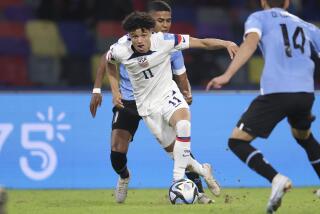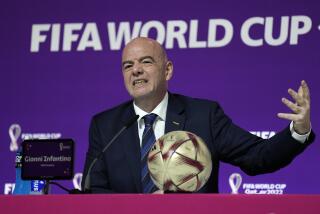Another Bora-Fest
- Share via
NIIGATA, Japan — He has never taken a team to the World Cup final. He has never taken a team past the World Cup quarterfinals. In the last World Cup game he coached, his heavily favored team lost to Denmark, 4-1. In the only season he coached in Major League Soccer, his team, the New York/New Jersey MetroStars, finished 7-25, still the league standard for futility.
Yet during this month-long convention of the world’s most renowned national soccer coaches, no other name is as popular or influential--or, quite probably, as rich--as that of the smiling Serbian who has bounced from Mexico to Costa Rica to the United States to Mexico again to Nigeria to, of all places, the People’s Republic of China, Velibor Milutinovic.
You can call him Bora, as he is known, simply and regally, in virtually all of the 100 countries he has visited.
(He hasn’t coached in all of them. It only seems that way.)
The only exception would be Bora’s current place of employment, China, where there is really no R sound in the language. Milutinovic is a mouthful in any language, so the Chinese have adapted for their adopted hero and guru, the first and only man to direct the world’s most populous country to the World Cup.
Milu is the name they use. Usually with exclamation point and excitable yelp attached.
It’s Milu! on the millions of T-shirts and posters that have been sold to his rabid followers, Milu! in the bold red type screaming from the nation’s newspapers, Milu! in the streets and in the restaurants, wherever a Bora sighting is announced.
That never happened when Bora took the United States to the second round of the 1994 World Cup--although in retrospect, maybe it should have. Considering the Americans’ humiliating 0-3-and-out ride of 1998 and the crew of sad-sack defenders who’ll be lining up against Portugal on Wednesday, Bora’s World Cup record as U.S. coach--1-2-1 with a 1-0 loss to eventual champion Brazil--is deserving of its own wing in the U.S. soccer hall of fame.
In China, where Bora ended a fruitless 44-year World Cup qualification campaign, just being here is more than enough. On the day of the country’s first World Cup game, against Costa Rica, Milu-mania has reached such outrageous proportions, some Chinese officials believe Bora has become too big for his own good and for the good of the people.
Last week, the Beijing Times published a series of mock revolutionary-style illustrations depicting Bora as a 1930s Communist soldier beneath a blaring red and yellow headline: “China must win.”
On television, Bora is ubiquitous, pitching a ridiculous array of products. His endorsement portfolio includes rice wine (Bora doesn’t drink), language-learning devices (Bora can speak barely a word of Chinese), DVD players (Bora watches a lot of soccer videos), tennis shoes (Bora does play a lot of soccer tennis) and air conditioners.
This advertising avalanche doesn’t sit well with Chinese soccer officials, who believe Bora is upstaging the soccer federation’s own endorsements. According to media reports, the central government is also less than pleased--this, after all, is China’s glorious hour, not Milu’s--and the Propaganda Bureau is considering a ban on ads by Bora after the team’s exit in the first round.
China will be leaving after the first round, will it not?
If so, it will be a first for Bora. Mexico in ‘86, Costa Rica in ‘90, the United States in ‘94, Nigeria in ‘98--Bora has guided each of these teams into the second round, a perfect four for four. Making it five for five with China would be Bora’s greatest achievement yet, considering the squad’s lack of star power--only three of China’s players compete professionally in Europe, none at the highest level--and China is grouped with four-time champion Brazil, Costa Rica and Turkey.
Bora has been as cagey as ever, regularly downplaying his team’s chances. But last week, with his defenses perhaps weakened by flu fever, Bora talked about what it would take to reach the second round--and how China just might be equipped to get there.
“We need maybe four points to go through,” he said. “I don’t like to make calculations.”
But he has. Costa Rica, badly weakened by injuries, is suddenly vulnerable. An opening upset of the Costa Ricans would mean three points. A tie with Turkey, making its first World Cup appearance since 1954, is not out of the question. That would be the necessary fourth point.
And then there is Brazil. By all indications, this is not a Brazilian squad up to usual standards, with an early look of a quarterfinalist at best. But Brazil against China? Everything about it suggests a mismatch.
Bora, however, has yet to concede.
“Everybody is thinking about Brazil without respect,” he said. “We need to respect them but this does not mean we are going to lose.”
He has, after all, been there before. Eight years ago, with a similarly undermanned U.S. squad, Bora found himself matched with Brazil in the second round. Brazil was loaded with offensive talent, with Romario and Bebeto at the height of their careers. On the Fourth of July in Palo Alto, Bora borrowed a tactic from the home team in the Revolutionary War--backtrack and defend--and held the Brazilians scoreless until Bebeto’s solitary breakthrough in the 74th minute.
That high-water mark in recent American soccer was followed by a washout four years later for Bora with Nigeria. Easily the most talented squad he had taken to a World Cup, Nigeria was touted by many as the first African team capable of reaching the cup final. Bora considers it the only team he has ever coached capable of winning the World Cup.
But after a fractious buildup, with the Nigerian players chafing under Bora’s conservative defensive system, Nigeria defeated Spain and Bulgaria, winning its group title and sending expectations rocketing. But in the second round, against an aging Danish side, Nigeria’s tenuous team chemistry collapsed and Denmark won in a rout, 4-1.
Bora Ball isn’t for everyone. It can be methodical and self-stifling and, to fans of free-flowing soccer, an out and out bore--which is one reason Mexico fired Bora before the ’98 World Cup, even though his team had qualified with an undefeated record.
It’s a style that won’t win over many fans accustomed to seeing their team winning and competing for championships and playing with a bit of flair here and there. But the tired, the downtrodden, the underachieving? Give them to Bora and he will get them to the World Cup. For them, at least on the first go-round, the second round is Mt. Everest.
As Bora is fond of saying, he travels the world and takes teams to the World Cup--”That’s all I do.”
That’s all Chinese soccer fans have wanted, for the last 44 years. For them, for now, that is enough.
It didn’t have to take that long, as Bora recently mentioned to the Associated Press.
“People said, ‘We waited 44 years,’” Bora said. “I say, ‘Why didn’t you call me before?’”






